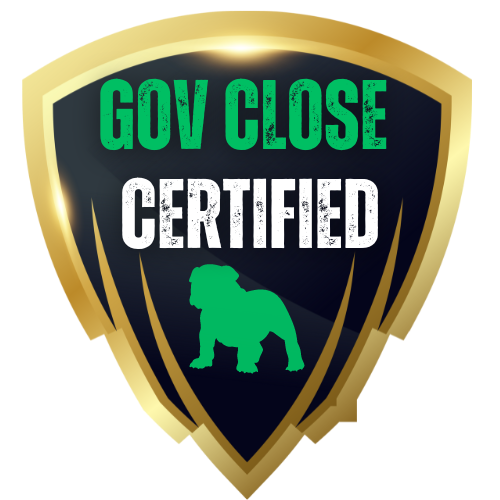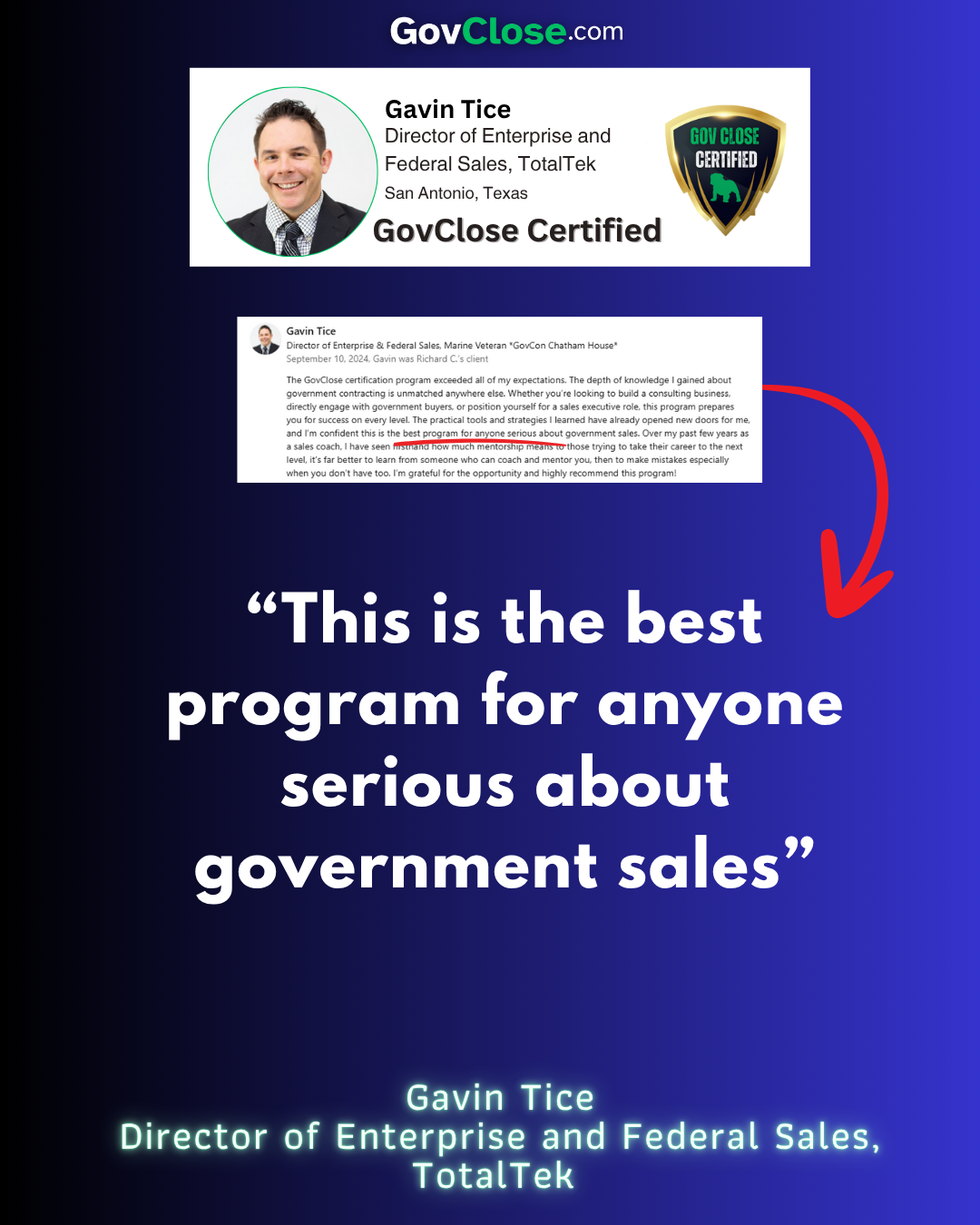
Gov Sales: A Relationship Game (Podcast Transcript)
Aug 25, 2022[01:11] Richard C. Howard: Hey, guys. Richard here with Richard C. Howard, LLC, and the government Sales Momentum Podcast. And today I want to talk a little bit about the relationship game involved with selling to the government. I talked to companies all the time and they're telling me about the problems they have selling to the government or just not understanding the process, or they're going through the Federal Acquisition Regulation and trying to get a grasp of that. Or maybe they're just frustrated that they can't get their foot in the door. On the government side, we knew it could be challenging for small businesses to sell to the government, which is why we have a lot of programs for small businesses. But it wasn't until I retired and gone into consulting that I really understood some of the real frustration out there that companies are having trying to navigate the process. Frankly, after talking with so many businesses, I'm surprised most businesses don't run screaming in the other direction when they really start looking into the process involved and the timeline involved. But what keeps businesses in the Government Sales game is, despite the long timelines and some of the frustration is the end result can be a very secure, very lucrative contract for their business. And a lot of companies end up pivoting from commercial sales to just government sales, although I typically recommend keeping a commercial and a government pipeline going in order to kind of offset each because each has its own challenges.
But today I wanted to really address influence and networking and like I said previously, that relationship game, right, it can almost seem counterintuitive, right? Because the Federal Acquisition Regulation goes to great lengths to make sure that there is no undue influence, that the general officers aren't retiring and directing, that the government put companies that they're interested in on contract, or that businesses aren't going and spending money on elaborate dinners and giving gifts to try to get contracts. And those things are legal and I'm definitely not talking about that when I'm talking about influence because there is certainly legal means to go and influence requirements to your favor. Essentially there are certain things that companies do routinely, all of them that are successfully doing this over and over again where they are putting themselves in a better position to win that contract when the solicitation comes out. So let's talk about that.
Now the first way of doing this, the first way of utilizing your relationships to influence your contract wins or even just find out about opportunities is to use your existing contracts, right? So I've talked about it in other podcasts but if you're already on contract with the government you should be meeting with your contracting officer or program manager. Whoever your interface is with at least once a month. Reaching out via email. Setting up meetings to talk about your contract. Make sure everything is going smoothly. See if there's any new category management or any new purchasing methods that the agency you're working with is considering but you're also when you're talking to them. So this is a relationship that you can use. You're going to ask them hey, is there anybody else that needs our services? Right? So if you're, whether you're a cyber security company or construction or you name it, help desk, whatever it is, you can ask them hey, is there anybody, is there another program manager, contracting officer out there that's doing this type of work that might need our services that we can meet with? The answer might not always be yes. But I'm here to tell you that the acquisitions community within the government is actually a pretty small community meaning it's not government wide.
Most people in the government don't have any authority to put a company on contract and most people in the government aren't managing those contracts, right? So typically we kind of know each other and know where to send folks. So you can actually generate a lot of leads just by asking the question who else would be interested? Or if you don't know of an active opportunity like are there any other offices that kind of manage these types of programs. You can get a lot of great contacts that way and learn and get some great leads so that's one existing contracts and really using those resources and those relationships that you already have and cultivating those to find new leads. Now another thing that you can do is kind of rely on other companies, right? So most businesses when they are approaching government sales are consistently doing that, have some type of subcontracting mechanism or pillar of their sales. We routinely see kind of a large businesses even flip flopping from being a prime and being a sub depending on what the opportunity is. So part of your plan should be taking opportunities and reaching out to other companies and submitting with them. And when you develop those relationships, what we've seen is they have their own, most companies have their own business development arm for the federal government. So when you create those subprime relationships, they're going to naturally want to use you on contracts they know are coming up. I have a client right now, same thing. We initiated some subcontracting arrangements with them on government contracts and that company then has other things in their pipeline that they realized that they could use one of our clients on. So that goes back and forth and you'll find also that you're going to find contracts that you want to prime on, but you can't do all the work and you're going to need a sub. So having those relationships there not only can help you with your proposal writing, but also will help you identify opportunities coming up. Some of those could be sole source contracts or mods that are going to your partner or your other company partner that isn't even going to have to be completed on, but they do need somebody to do part of that work and that could be you. So make sure you use those other companies that you're working with to help identify new opportunities that you might not have been aware of. And then finally I mentioned that the government acquisitions network is relatively small and that's true. And one thing that's nice and I can speak directly to the military side is you hear all the time about the military having a hard time transitioning after they retire or after they leave service.
One area where that's not the case is acquisition. So usually our contracting officers, our program managers are in very high demand with companies when they leave. I myself, I know I received quite a few offers when I left to go do business development for other companies, to go be a program manager full time. And a lot of the bigger companies have huge teams of former government acquisitions professionals. And the whole goal is they know that those individuals know the people that are making decisions, putting people on contract, they know about opportunities and they understand the process. So my point here is even a smaller business needs to consider hiring a business developer with a federal acquisitions background. Now that can be challenging for a newer business if you have a small team of people because typically those salaries are pretty high if you're actually dealing with someone that has that background. And they probably have multiple master's degrees and decades of experience. But you may consider using someone part time or on a consulting basis. I know with our company we specialize in small businesses, so we go out of our way to provide business developers on a part time basis that's actually a little bit more affordable for small businesses. But you may be able to afford a full time business developer or someone that's not on a consulting basis, but maybe someone that can give you 20 hours a week. So it really depends on exactly what you're looking for. But considering hiring someone with that background in that existing network can go a long way. So those are my initial thoughts on just the relationships and how important they are and maybe some tactics that you can use to help identify opportunities and influence those opportunities through your relationships.
By the way, those relationships, when you know the program managers and contracting officers and you've identified an opportunity, keep in mind now you're going to work with them, especially if the solicitation hasn't come out yet, on helping them develop requirements and you're making recommendations, you are advising them on maybe the technical details of an upcoming opportunity. So all those things are going to go into your favor when a solicitation actually comes out. And a lot of companies managed to arrange a sole source contract or maybe using another method that getting on contract with the government that they weren't aware of, like a broad agency announcement, a baa. We see those and I've used them in the past on the government side a lot. So that's something you may be able to utilize and find out about through your relationship network. That's all I've got on this. Thanks for listening and looking forward to talking with you guys in the future via the Government Sales Momentum podcast. You can always reach out to us at Dodcontract.com, or fill the consultation form here if you want to talk to me, one of my subject matter experts in the consortium. Have a great day.
[11:00] Richard C. Howard: Hey guys, Ricky here and hope you enjoyed this episode of Government Sales Momentum. If you did enjoy the episode, please subscribe to the podcast and leave a review. It's very much appreciated. If you're interested in selling products and services at the Department of Defense, I have something for you that you're not going to find anywhere else in the world. The team and I created a program that takes everything you need to win defense contracts and put it into one place. Up until now, only large defense companies and a small amount of people in the know have had access to how products and services are really sold to the Department of Defense. I've taken all of that information and put it in a step-by-step training module that shows you how to consistently sell to the US. Military. You join our membership, not only do you get the model, but you get weekly sessions with former DOD acquisitions officers for training guidance to answer your questions, and a community of like-minded business owners that want to partner on different opportunities to bid for subcontracting and teaming, or just to discuss general strategy on how to sell to the DOD. You have access to every course I've created, every coaching session I've ever recorded in every interview with an acquisitions professional that I've ever conducted. And we cover topics that range from defense sales planning and competitor analysis to SBIR and STTR foreign military sales. The list goes on. Go to Dodcontract.com if you are interested and I would love to see you in the membership.
You can also check out How Conversations and Relationships can Help you win Contracts to help identify opportunities in Federal sales. Thanks.
Turn Government Contracting Knowledge Into Income
This isn’t a course. It’s a certification and implementation system to help you build a consulting business, land a high-paying sales role, or scale your own company in federal contracting.
We hate SPAM. We will never sell your information, for any reason.


